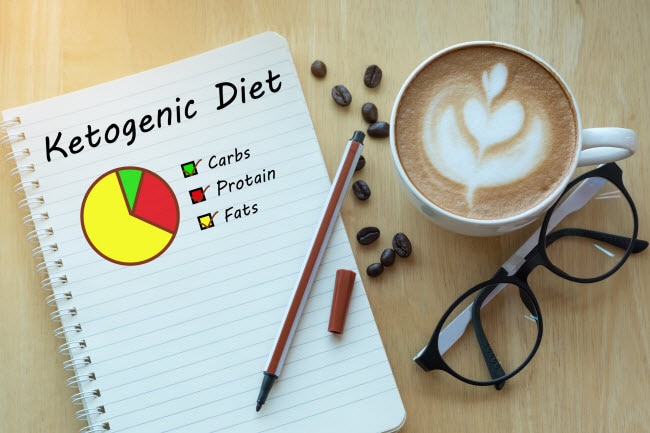Celebrities like Katie Couric, Halle Berry, Gwenyth Paltrow, a couple of the Kardashians and even LeBron James sing the praises of the ketogenic (keto) diet. The most popular keto-diet chorus you hear surrounds the successful shedding of lots of weight.
But other than weight loss, what’s there to sing about? While a number of medical professionals express skepticism about whether the low-carb, high-protein, high-fat keto diet is safe or effective over the long term, fans say the diet is music to their ears (and lifestyles). In fact, they tout benefits of the keto diet that you might not know about.
“The keto diet is commonly used as a therapeutic diet for medical conditions, but recent research has shown that it can be healthy for just about everyone. I know this goes against our traditional teaching, but the research and anecdotal results are exciting,” says internal medicine specialist Dr. Eric Westman, director of Duke University’s Lifestyle Medicine Clinic and co-founder of the keto-promoting HEAL Clinics.
Westman adds that the keto diet might trigger some initial side effects, like headache or fatigue, but that’s simply part of adapting to a new way of eating.
“You may be surprised,” he says, “but the human body works fine without eating carbohydrates at all.”
Based on input from keto-diet experts, researchers and believers, here are five potential upsides of the diet that could have you singing a new, and healthier, tune.
1. Perked-up energy
“Most people feel better when they limit the amount of sugars and starches that they eat,” Westman says. “There is a feeling of having more energy. For example, there are no more after-meal slumps, no more ‘hanger’ (a mash-up of hunger and anger) or obsessive thoughts about food.”
Stephanie Laska, author of “DIRTY, LAZY, KETO: Getting Started: How I Lost 140 Pounds,” can attest to the lift in energy supplied by the keto diet.
Laska says she’s followed a keto-inspired diet for nearly seven years. While she’s thrilled about dropping 140 pounds, she was surprised by the secondary benefits — namely the increase in energy. Today, Laska is free of constant mood swings and energy swings, she says.
“In fact, a testament to this type of energy I am speaking about is that I ran 12 marathons in the last five years,” Laska says. “I had never run a mile in my life until starting the keto diet. Who would’ve thought that pushing age 40 I could take up such an intense sport such as running?”
2. Extended longevity
A study published in 2017 in the journal Cell Metabolism indicates being on the keto diet could result in a longer lifespan for humans, as well as a slowing of the age-related decline in motor function, memory and muscle mass.
In the study, researchers at the University of California, Davis found that in three groups of mice fed three different diets — high-carb, low-carb and high-fat (keto) — the keto-diet mice came out with better outcomes for longevity, physical strength and mental acuity.
“The results surprised me a little,” says nutritionist Jon Ramsey, one of the researchers involved in the study. “We expected some differences, but I was impressed by the magnitude we observed — a 13 percent increase in median lifespan for the mice on a high-fat versus high-carb diet. In humans, that would be seven to 10 years. But equally important, those mice retained quality of health in later life.”
3. Treatment of certain diseases
While studies support the value of using the keto diet for treatment of epilepsy and diabetes, data also shows potential for incorporating the diet into treatment of neuromuscular and neurodegenerative conditions such as Alzheimer’s disease, Parkinson’s disease and ALS (Lou Gehrig’s disease).
Researchers say these and other positive facets of the keto diet deserve further study.
“How can a simple dietary change lead to improvement in disorders with such a huge span of … mechanisms? Alterations in energy metabolism appear to be a common theme,” according to an article published in 2012 in the journal Frontiers in Pharmacology.
4. Better sleep
In a study released in 2006 by the International League Against Epilepsy, Swedish researchers found that although children with therapy-resistant epilepsy who followed a keto diet slept less, the quality of their sleep got better. The increased quality of sleep — including better REM sleep — seemed to contribute to a greater quality of life for the epilepsy patients, the researchers reported.
No studies have shown a broader correlation between the keto diet and improved sleep. According to the news website Insider, anecdotal evidence indicates a keto dieter actually might experience insomnia or trouble staying asleep in the first three to five days after going on the diet. But after that period, the dieter might snooze longer, sleep deeper and feel more rested.
5. Enhanced sex life
Dr. David Shusterman, a New York City urologist who specializes in sexual health and wellness, says nutritional improvements — such as adhering to the keto diet — can produce hormonal changes that then can lead to a more satisfying sex life.
“One of the number one ways to improve your sex life is by simply improving your diet and choosing a healthier alternative to low-quality, fat-packed fast foods that burden the body more than what food ought to be doing, which is to nourish and replenish,” Shusterman says.

